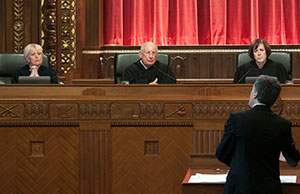Cleveland Man Convicted of Aggravated Murder Asks Court to Reverse His Death Sentence
Seven Cases to be Considered by State’s Highest Court on February 5 and 6

The Supreme Court will hear seven cases this week, including a death penalty appeal, an employment law dispute, and an evidence tampering conflict.

The Supreme Court will hear seven cases this week, including a death penalty appeal, an employment law dispute, and an evidence tampering conflict.
The Supreme Court of Ohio on Tuesday will hear the death penalty appeal of a Cuyahoga County man found guilty of shooting and killing a laundromat employee during a 2009 robbery, one of multiple crimes he committed in three counties over 17 days in June of that year.
Following a trial, Jeremiah Jackson was convicted of aggravated murder, two attempted murders, several robberies, kidnapping, and other offenses.
Attorneys for Jackson argue in Jackson v. State that his intellectual capacity is impaired enough by some standards that the state may be barred from executing him. Jackson’s attorneys believe that the trial court showed bias favoring the state when it ordered a hearing to consider whether Jackson was intellectually disabled. They claim the court held the hearing, without a request by the defense, to try to prevent an appeal on this issue.
Among other claims of errors made during Jackson’s trial, the attorneys contend that Jackson did not freely agree to waive his right to jury trial given that he said his head was banging and he was having difficulty focusing during the waiver discussion. They also maintain that the Cuyahoga County grand jury did not have jurisdiction to indict Jackson for the offenses that took place in Erie and Lorain counties.
The appeal is the first of three cases to be argued before the court on February 4. The court will consider four more cases on Wednesday, February 5. The court’s sessions begin at 9 a.m. each day at the Thomas J. Moyer Ohio Judicial Center in Columbus. The arguments will be streamed live online at sc.ohio.gov and broadcast live on The Ohio Channel.
Along with the brief descriptions below, the Office of Public Information today released summaries of the seven cases.
Cases for Tuesday, February 4
In addition to Jackson, the court will hear two other cases during Tuesday’s session:
- A key issue in State v. Morris is whether certain testimony provided during the trial of a Medina County man convicted of raping his minor stepdaughter was improperly admitted. The state argues that any error did not involve the defendant’s constitutional right to a fair trial, so the appellate court should have reviewed the issue using a non-constitutional legal standard, which would have upheld the conviction.
- Paliath/Home Town Realty v. Auer involves a real estate brokerage whose independent contractor salesperson sold several Dayton properties to a California resident as investments. The buyer sued for fraud, and the brokerage contends that it is not liable for the salesperson’s actions because her illicit conduct was outside the scope of her employment with the company.
Cases for Wednesday, February 5
The court will consider four cases on Wednesday:
- City of Westlake v. Pietrick centers on the demotion of a Westlake fire chief disciplined for making subordinate firefighters perform maintenance on his personal vehicles while on the clock. On appeal, the common pleas court changed the demotion to a different position. The city asserts that the common pleas court did not have the authority to modify the fire chief’s demotion when it found that he exercised extremely poor judgment.
- In State v. White, a police officer in Ottawa Hills stopped a motorcyclist who he believed was impaired and shot the man in the back when he thought the man was pulling a weapon. The officer was sentenced to a ten-year prison term. The state maintains that the three-year sentence he received for a firearm specification was properly imposed because the law under which he was charged contains no exception for police officers who use their guns while on duty. They also argue that the civil immunity that public employees have does not extend to criminal cases.
- In State v. Tolliver, a man shoplifted merchandise from a dollar store in Montgomery County and, when confronted, pushed a store manager. The court of appeals held that the jury instructions at the man’s criminal trial should have stated that the man had to have acted recklessly in his use of force while committing the theft to be convicted of robbery. The state argues that there is no culpable mental state required for the use-of-force element of robbery, so no error was made in the jury instructions.
- The court is asked in State v. Straley to resolve a conflict between two appellate districts regarding when a person may be found to have tampered with evidence. In Clark County, a woman was pulled over by detectives for traffic infractions and suspected intoxication. While they were trying to find her a ride home, she stepped away from the officers to urinate and discarded a bag of cocaine, which the officers found. The state contends that investigations encompass whatever criminal conduct the police come across, so the woman could be found guilty of evidence tampering even though the traffic stop was initially unrelated to drugs.


